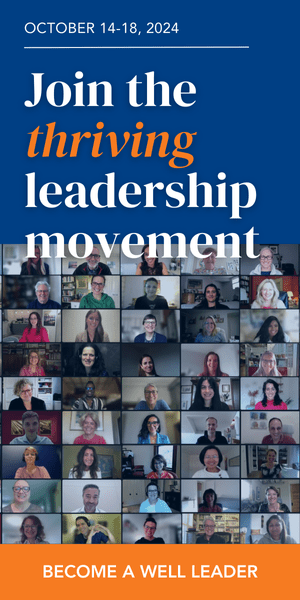Be Well Lead Well® is committed to advancing the consciousness and capabilities for more inclusive, well, and wiser leadership. In support of these efforts, Be Well Lead Well® Director and Wisdom Works CEO, Renee Moorefield curates monthly content and resources for The Wellness Moonshot: A World Free of Preventable Disease, an initiative of the Global Wellness Institute. The goal: to bring together global wellness enthusiasts, from scientists and educators to health experts and business leaders, to eradicate preventable disease worldwide.
Each month, Renee explores wellbeing leadership through the themes of The Wellness Moonshot Calendar. Below is an excerpt from July’s Theme: BEGIN
July 2022 | BEGIN
We live in an age where non-communicable diseases (NCDs), such as cardiovascular diseases, cancers, and diabetes, are the primary global health problem, accounting for a colossal 7 out of 10 deaths, shorter lifespans, and reduced quality of life. Diet is one of the leading risk factors for NCDs worldwide.
So it should be no surprise that when it comes to creating a world free of preventable disease—the bold mission of The Wellness Moonshot—an essential place for us to BEGIN is in our relationship with food.
CHANGING HOW AND WHAT WE EAT, HOWEVER, IS FRAUGHT WITH PARADOX
Today we consume the largest amount of food in history, yet we cannot always trust what we eat. At the same time more than 820 million people go to bed without enough nutrition every day, overweight and obesity are on the rise, particularly among school-age children and adults—and, though we spend more money than ever trying to eat healthy and lose weight, we still can’t figure out how to apply our collective energies and wealth to feed the hungry. An explosion of books, media programming, social influencers, and wellness experts now tell us how to eat, yet we find it hard to eat well. Shifting our relationship to food seems to be more difficult than putting a man on the moon!
Nevertheless, there are bright spots—changemakers such as Jian Yi, founding President of the Good Food Fund, an organization that serves as a hub for empowering food system stakeholders to make positive, systemic change. As in my conversation with food system disrupter Victor Koo, Jian Yi has a clear perspective on both the significant challenges and exciting opportunities for building a healthier relationship with food, as individuals, communities, and societies.
LISTEN TO RENEE & JIAN YI EXPLORE THE PLANT-FORWARD MOVEMENT, INNOVATIONS IN REDUCING FOOD WASTE, AND EMERGING WELLBEING LEADERS (CHEFS!)
THREE MINDSET SHIFTS THAT TRANSFORM HOW WE RELATE TO FOOD
According to Jian Yi, transforming how we relate to food requires at least these three mindset shifts:
- We must understand the limits of our natural resources. Consider that when you walk into a supermarket, an overwhelming number of things compete for your attention. The experience gives you, usually without awareness, the feeling that our world’s resources are infinite. This is an illusion—and it shapes our actions often in deleterious ways. Food systems, in fact, rely on our natural resources, many of which are non-renewable. Reimagining our food systems to respect these limits is imperative for meeting our growing food demands.
- We must take personal ownership. We frequently don’t know where our food is from, we don’t have access to healthy food (and instead are surrounded by unhealthy options), and we’ve forgotten how to grow what we need to feed ourselves. While most people on the planet have benefited from globalized, corporate food systems, there have also been many costs. One of the most fundamental? We’ve disconnected from how and what we eat. This disconnection is a reason behind much of our disease and dis-ease. As a pathway to health and wellbeing, we must reconnect with the process of producing food, plus redesign food systems that are equitable, sustainable, and culturally sensitive. This isn’t just about our generation—the decisions we make today empower or erode the access to good food for generations to come.
- We must count our blessings. Food is a source of nourishment for our lives, our relationships, and the social fabric of our communities. We can learn to be grateful for the ability to sit down together for a nourishing meal, a simple act that many people around the world cannot do.
Jian Yi says that mindfulness is at the heart of these three shifts for building a healthy relationship to every aspect of food and food systems. When we are mindful, we are present to connect to ourselves and other living beings, as well as Mother Earth. In that respect, transforming our relationship to food is a pathway for our development as human beings.







